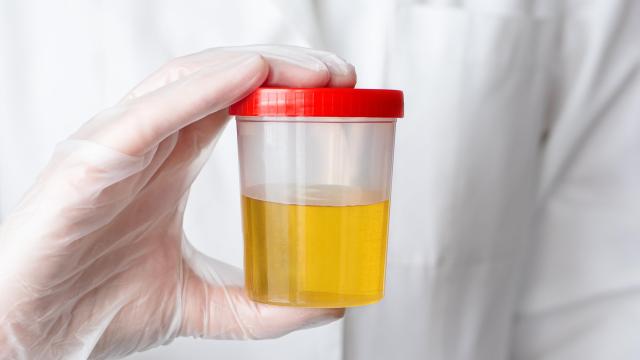Scientists say they’ve finally answered an age-old question: Just why is our pee yellow? In new research, a team found the enzyme produced by gut bacteria that plays a major role in turning our urine mellow. Curiosity aside, the discovery may actually help scientists better understand the gut microbiome and how it can contribute to certain health conditions, like jaundice in newborns.
Urine is the finale of our body’s natural drainage system. It’s made out of excess water and waste products filtered out of our blood via the kidneys. Some of these waste products are created when our cells reach the end of their life cycle, including the red blood cells that use hemoglobin to deliver oxygen throughout the body. An important compound produced by red blood cells is heme, the precursor to hemoglobin, and the eventual degradation of red blood cells and their heme results in a chain of events that causes urine to be yellow.
Scientists have known for a while that the chemical urobilin is primarily responsible for urine’s yellow color. But according to lead author Brantley Hall, an assistant professor in the University of Maryland’s Department of Cell Biology and Molecular Genetics, we’ve remained in the dark about a crucial step leading up to urobilin’s presence in urine—the part that gut bacteria play in further breaking down the byproducts of heme.
In a study published Wednesday in the journal Nature Microbiology, Hall and his team detail the missing piece of the puzzle.
“When red blood cells degrade after their six-month lifespan, a bright orange pigment called bilirubin is produced as a byproduct. Once in the gut, the resident flora can convert bilirubin into a molecule which can turn yellow if exposed to oxygen. This molecule, urobilin, is a major reason why urine is yellow,” Hall told Gizmodo in an email. “In this study, we found the enzyme responsible for this reaction.”
The team has coined their newfound enzyme bilirubin reductase, or BilR. They were able to find the gene responsible for producing the enzyme among certain gut bacteria in the large intestine, particularly a group of bacteria called Firmicutes, and confirm its function in breaking down bilirubin. They also showed that BilR is readily found in the gut microbiomes of healthy adults, further cementing its important role.
As for why it’s taken so long to figure out how urine turns yellow, Hall notes that studying our tiny gut tenants has historically been difficult.
“Unfortunately, gut microbes can be challenging to study. The gut is a low-oxygen environment, and many of the bacteria in our guts can’t survive if too much oxygen is present, making them difficult to grow and perform experiments on in labs,” he said. “Our work to find BilR relied on combining experimental screening with genomic analysis, an approach that has only become possible with the isolation of more gut bacterial species and the advancement of genome sequencing technology.”
Answering fundamental questions about our biology is important. But the team’s work may pay off in other ways as well. They note that BilR was less commonly found in newborns and people with inflammatory bowel disease. And it’s possible that a gut microbiome unable to produce BilR might contribute to newborn jaundice and pigmented gallstones—both conditions strongly tied to an overabundance of bilirubin in the body.
More research will be needed to confirm any links between gut microbes, BilR, and these conditions, Hall says, which the team is already planning to work on. They next hope to conduct observational human studies to better understand how the reduction of bilirubin by gut microbes can influence the concentration of bilirubin in our blood. And they would especially like to study premature infants, since they’re at higher risk for jaundice and lower BilR levels.
